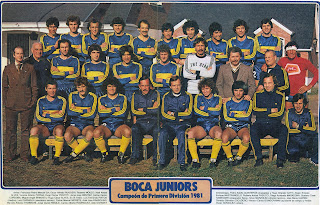First Division – Campeonato
Metropolitano – had one hopeless outsider and two teams competing
for the title. Colon (Santa Fe) was the outsider – they finished
last with 21 points. Apart from Colon, the struggle for survival was
fierce - in the final table 6 points separated 7th from
17th place.
San Lorenzo de Almagro (Buenos Aires)
lost the battle by a point and finished 17th with 28
points. Along with Colon, one of the strongest teams in the early
1970s was relegated.
Other clubs in bad shape were:
Argentinos Juniors, which without Maradona immediately dropped from
title contender to just trying to escape relegation – they finished
16th with 29 points.
Talleres (Cordoba) finished also with
29 points, but better goal-difference placed the 15th.
Estudiantes (La Plata) were 14th.
Velez Sarsfield was 11th. These the clubs in bad shape
this year. The opposite way took two teams.
Sarmiento (Junin) finished 13th.
Nothing special, at first glance, but they were debutantes and prime
candidates for relegation. But the modest newcomers fought to the end
and ensured at least one more season among the best.
The second team was a pleasant
surprise and, if we move the focus from Maradona, the most
interesting thing in Argentine football this year. About them – in
a moment.
Huracan finished 8th –
nothing much, really, but they distinguished themselves in unusual
way: Centurion's goal sent San Lorenzo to Second Division. Standing
from left: Turco García, Pogany, Jorge Gutiérrez, el Negro
Longo, Clide Díaz, Toledo.
First row: Cheves, Agüero, Daniel
Cano, Carlos Babington, Centurión.
Racing
Club had a relatively good season – they finished 5th,
ahead of local rivals Independiente. Not a bad squad, but just a
promising one at the moment. Hugo Barbas was the veteran star,
playing back in Argentina after many years in France, Van Tuyne was
the current star player, and Calderon and Olarticoechea were fresh
upstarts, still unknown far and wide. Standing from left:
Olarticoechea, Van Tuyne, Osvaldo Pérez, Vivalda, Berta, Leroyer.
Crouching:
Calderón, Barbas, Villarruel, Carrasco, Muñiz.
River
Plate misfired – full of great names, including Tarantini and
Kempes, they finished 4th.
A point ahead of Racing, missing 3rd
place on goal-difference, and... not at all running for the title. 39
points – the contenders finished with much more.
Newell's
Old Boys edged River Plate from 3rd
place and, to a point, the team did surprisingly well – compared to
River Plate, they were nothing as names. Killer was a star, but
hardly on the level of Kempes, Alonso, Passarella, and Simon... well,
the world had still to wait many years before hearing of him. Third
place, but far away from the title – they finished with 39 points.
The silver medalists ended with 49.
Two teams competed
for the title to the very end of the championship – at the end 1
point separated them. One of the leaders was expected – Boca
Juniors. The acquisition of Diego Maradona made them instant
favourites. The other team was a big, but pleasant surprise – a
team without stars, usually modest and hardly ever making news.
Ferro
Carril Oeste, long time First Division members, but one of the
smaller clubs in Buenos Aires. And still nothing special, considering
the squad – perhaps Garre was their best known player, and he was
not exactly first-rate star. Cuper is immediately noticed today, but
this is because he became famous coach – Cuper, the player, was not
a star. Yet, this largely anonymous and modest squad not only left
River Plate far behind, but played as equals with Boca Juniors and
Maradona. They even lost fewer matches than Boca and had much better
defensive record. Unfortunately, Boca won more more matches then the
boys in green and white and they lost the title by a point. Looked
like one time wonder, this team, but they were not.
With
Diego Maradona now, Boca Juniors must have been formidable team. They
were strong before his arrival, having strong run for some time –
with him, they had to be almost unbeatable. Everything looked
perfect: young Diego was Boca fan and was delighted to see his dream
coming true. Hugo Gatti was happy to see Diego on his side instead of
scoring him humiliating goals. Diego arrived and Boca immediately won
Metropolitano – predictions fulfilled... but it was not an easy
victory at all. And considering the rival, Boca Juniors did not seem
overwhelming at all. But a title is a title.
Champions – no
matter what, one cannot argue against the fact.










